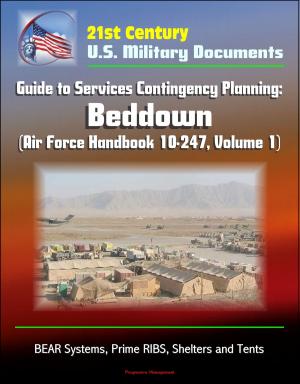The Role of Prepositioned Stocks: Sustaining and Responding to Foreign Humanitarian Assistance and Disaster Relief (HADR) Operations - Logistics Efforts in Haiti, Pakistan, and the Philippines
Nonfiction, History, Military, United States, Social & Cultural Studies, Social Science| Author: | Progressive Management | ISBN: | 9780463515327 |
| Publisher: | Progressive Management | Publication: | April 30, 2018 |
| Imprint: | Smashwords Edition | Language: | English |
| Author: | Progressive Management |
| ISBN: | 9780463515327 |
| Publisher: | Progressive Management |
| Publication: | April 30, 2018 |
| Imprint: | Smashwords Edition |
| Language: | English |
This excellent report has been professionally converted for accurate flowing-text e-book format reproduction. this unique study examines
The majority of the international natural disaster relief operations that the U.S. Government responds to are led by the United States Agency for International Development's Office of Foreign Disaster Assistance. One of the leading issues of the study examines the inter-working relationships and coordination efforts regarding seamless humanitarian logistics from prepositioned sites supported from the DOD, interagency partners, and coalition partners for the affected state. A major problem within a geographical disaster region is the response time of aid into the affected region. The ability to foresee and anticipate the massive logistical processes, would be a major breakthrough in successful HADR response. In addition, the knowledge assembled through multiple lessons learned and decades of HADR operations should encourage subject matter experts to collaborate from within the humanitarian community, both internally among the USG and externally throughout the International humanitarian partnerships.
CONTENTS * ABSTRACT * ACKNOWLEDGMENTS * TABLE OF CONTENTS * ACRONYMS * ILLUSTRATIONS * TABLES * CHAPTER 1 INTRODUCTION * Background * Thesis Statement * Research Questions * Primary Research Question * Secondary Research Questions * Assumptions * Delimitations * Limitations * Defining Terms * Significance of Study * Conclusion * CHAPTER 2 LITERATURE REVIEW * Introduction * Problem Statement and Scope * HADR Policy * USG Policy * Roles * Responsibilities * DOD Policy * Roles * Responsibilities * United Nations Policy * Roles * Responsibilities * Prepositioning Programs * United States Government * Capabilities * Locations * Department of Defense * Capabilities * Locations * United Nations * Capabilities * Locations * Non-Governmental and International Organizations * Capabilities * Locations * Humanitarian Logistics * Humanitarian Assistance Coordination/Synchronization * U.S. Armed Forces Guidelines * NGHOs Guidelines * HADR Operations and DOD Response Efforts * Haiti * Pakistan * Philippines * Conclusion * CHAPTER 3 RESEARCH METHODOLOGY * Introduction * Methodology Process * Principles of Logistics * Methodological Approach * Step 1 * Step 2 * Step 3 * Step 4 * Step 5 * Identify Problem * Applying the Principles of Logistics * Integration * Anticipation * Responsiveness * Continuity * Improvisation * Applying the Principles of Logistics * Analysis Approach/Data Collection Instruments * Qualitative Data Analysis * Conclusion * CHAPTER 4 ANALYSIS * Introduction * Applying the Principles of Sustainment Analysis to the Case Study Assessments * Haiti * Pakistan * Philippines * Data Points Recognized * Prepositioning Programs and Stocks * Humanitarian Coordination and Synchronization * Humanitarian Logistics and Enablers * Principles of Logistics Analysis * Qualitative Analysis * Summary * CHAPTER 5 CONCLUSIONS AND RECOMMENDATIONS * Introduction * Purpose of Research * Summary of Findings from Chapter 4 * Interpretation of Findings * Unanticipated Findings * Recommendations * Recommendations for Future Studies * Endorsements for Action * Summary and Conclusions * GLOSSARY * BIBLIOGRAPHY
This excellent report has been professionally converted for accurate flowing-text e-book format reproduction. this unique study examines
The majority of the international natural disaster relief operations that the U.S. Government responds to are led by the United States Agency for International Development's Office of Foreign Disaster Assistance. One of the leading issues of the study examines the inter-working relationships and coordination efforts regarding seamless humanitarian logistics from prepositioned sites supported from the DOD, interagency partners, and coalition partners for the affected state. A major problem within a geographical disaster region is the response time of aid into the affected region. The ability to foresee and anticipate the massive logistical processes, would be a major breakthrough in successful HADR response. In addition, the knowledge assembled through multiple lessons learned and decades of HADR operations should encourage subject matter experts to collaborate from within the humanitarian community, both internally among the USG and externally throughout the International humanitarian partnerships.
CONTENTS * ABSTRACT * ACKNOWLEDGMENTS * TABLE OF CONTENTS * ACRONYMS * ILLUSTRATIONS * TABLES * CHAPTER 1 INTRODUCTION * Background * Thesis Statement * Research Questions * Primary Research Question * Secondary Research Questions * Assumptions * Delimitations * Limitations * Defining Terms * Significance of Study * Conclusion * CHAPTER 2 LITERATURE REVIEW * Introduction * Problem Statement and Scope * HADR Policy * USG Policy * Roles * Responsibilities * DOD Policy * Roles * Responsibilities * United Nations Policy * Roles * Responsibilities * Prepositioning Programs * United States Government * Capabilities * Locations * Department of Defense * Capabilities * Locations * United Nations * Capabilities * Locations * Non-Governmental and International Organizations * Capabilities * Locations * Humanitarian Logistics * Humanitarian Assistance Coordination/Synchronization * U.S. Armed Forces Guidelines * NGHOs Guidelines * HADR Operations and DOD Response Efforts * Haiti * Pakistan * Philippines * Conclusion * CHAPTER 3 RESEARCH METHODOLOGY * Introduction * Methodology Process * Principles of Logistics * Methodological Approach * Step 1 * Step 2 * Step 3 * Step 4 * Step 5 * Identify Problem * Applying the Principles of Logistics * Integration * Anticipation * Responsiveness * Continuity * Improvisation * Applying the Principles of Logistics * Analysis Approach/Data Collection Instruments * Qualitative Data Analysis * Conclusion * CHAPTER 4 ANALYSIS * Introduction * Applying the Principles of Sustainment Analysis to the Case Study Assessments * Haiti * Pakistan * Philippines * Data Points Recognized * Prepositioning Programs and Stocks * Humanitarian Coordination and Synchronization * Humanitarian Logistics and Enablers * Principles of Logistics Analysis * Qualitative Analysis * Summary * CHAPTER 5 CONCLUSIONS AND RECOMMENDATIONS * Introduction * Purpose of Research * Summary of Findings from Chapter 4 * Interpretation of Findings * Unanticipated Findings * Recommendations * Recommendations for Future Studies * Endorsements for Action * Summary and Conclusions * GLOSSARY * BIBLIOGRAPHY















